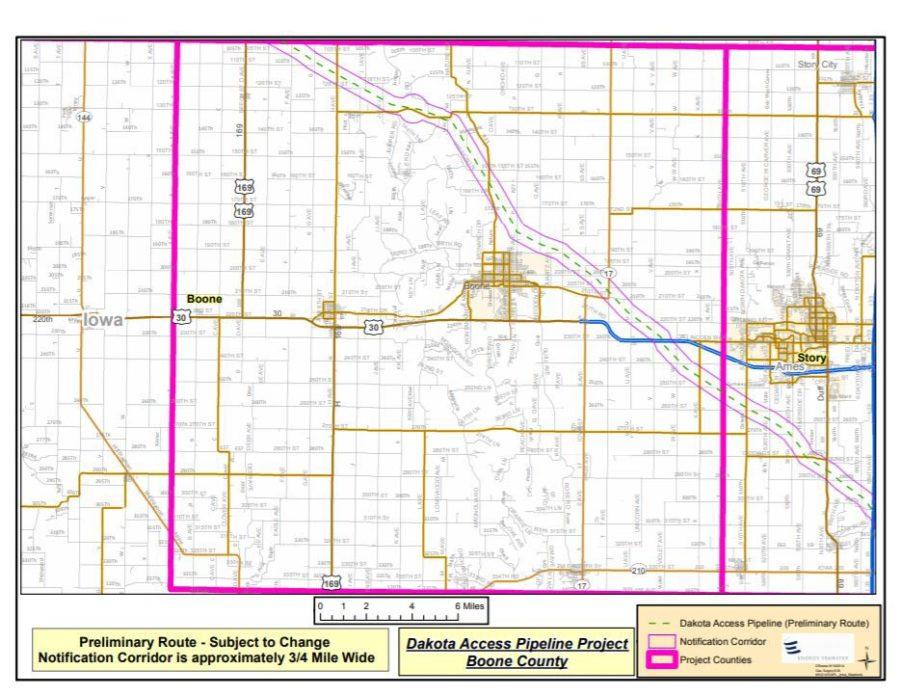- News
- News / Politics And Administration
- News / Politics And Administration / City
- News / Politics And Administration / State
- News / State
Iowa Supreme Court hears Dakota Access Pipeline appeal
September 12, 2018
About two miles outside of Ames sits the Dakota Access Pipeline – the subject of an Iowa Supreme Court case.
A group of farmers and the Sierra Club environmental interest group argued in the Iowa Supreme Court that Dakota Access’ use of eminent domain for an interstate pipeline violated Iowa’s and the United States’ constitutions on Wednesday.
The Dakota Access Pipeline is buried nearly two miles outside of Ames. The pipeline stretches diagonally across the state of Iowa, covering some 343 miles of the total 1,172 miles between the Bakken and Three Forks production area in North Dakota and the refinery located in Patoka, Illinois.
According to Dakota Access, Story County houses the only oil pump station in Iowa.
Lawyer William E. Hanigan spoke on behalf of the landowners, arguing the decision of the Iowa Utilities Board to grant Dakota Access eminent domain in Iowa was unconstitutional.
According to the Iowa Code, the Iowa Utilities Board has the power to allow a pipeline company such as Dakota Access to acquire land without the owner’s permission, as long as there is adequate payment and the pipeline is used for a public purpose, public use or public improvement.
Hanigan argued the pipeline was not at all in the public’s interest.
“Iowans have no direct use” Hanigan said, pointing to Iowans’ alleged inability to profit from the pipeline directly.
Hanigan said since the pipeline flowed directly through the state without any refineries or other major oil infrastructure in place, it did not directly profit Iowans.
Bret A. Dublinkse, a lawyer for Dakota Access, argued the accusations brought up by the landowners and the interest groups were already null.
“The bill is now an established fact…and now a moot point,” Dublinske said.
Dublinske also said the Sierra Club had no standing because its arguments were based on anticipatory arguments and a lot of “if” statements.
Dublinske also said throughout the argument the high-profile nature of the case shouldn’t affect the justices’ decision.
“Just because it has a higher presence does not change what the law is,” Dublinske said.
According to Dakota Access, the pipeline cost more than $3.8 billion and can transport more than 500,000 barrels of oil per day.
The pipeline is nestled in a 150-foot right-of-way beneath the ground that Dakota Access has bought from the farmers. The middle 50 feet houses the pipeline, while the adjacent 50 foot segments were used to hold the excess dirt and equipment during construction.
Farmers and appellant LaVerne Johnson said it is within those 150 feet that trouble begins. Dakota Access used eminent domain to route a pipeline diagonally across six acres of Johnson’s land, and in the process, destroyed the productive capacity of the soil, Johnson said.
Instead of corn or soybeans, Johnson planted sunn hemp on his right-of-way to break up some of the compaction caused by the construction of the pipeline, which has cost him a lot of money and yielded no income, Johnson said.
Johnson said he thinks his land won’t be productive for many years and may never get back to the productive capacity it once had.
“It has taken us a long time to get our chance to get our day of justice,” Johnson said. “It’s been thwarted many times by Dakota Access and to be honest with you this thing should have been nipped in the bud.”
Steve Hickenbottom, a farmer and petitioner on the Supreme Court case, has had similar experiences with the pipeline.
Hickenbottom said the pipeline runs across eight acres of his land and has caused severe soil compaction and drainage issues.
“It’s been hell,” Hickenbottom said. “It’s just – you don’t sleep at night.”
Landowner and former lawyer Keith Puntenney said he believes those sleepless nights aren’t going away anytime soon.
“I expect this to take several months before there is any kind of a final result because of the volume of information that they and their clerks and everyone else is going to have to digest,” Puntenney said.
Puntenney also thinks the case might take longer, not only because of its complexity, but due to its importance and precedence as a case.
“It’s an extremely important case in Iowa, because as they clearly pointed out, there is no precedent in Iowa for a [Iowa Code] 479B pipeline that is 30 [inches] that is a hazardous liquid pipeline,” Puntenney said. “And that in itself makes it totally different from all the other case laws that’s out there that deals with gas, which is another code section in its entirety.”
Even if the case is ruled in the farmer’s favor, they still have to deal with the land that has already been damaged by the pipeline, Puntenney said.
“I’m hopeful, but realistic,” Puntenney said. “This is not the end of the journey, this is frankly the begin of a downhill journey for those of us who are landowners and still have to deal with remediation issues.”
Puntenney, Johnson and Hickenbottom said they were happy with the arguments made by their lawyers and pointed out the Supreme Court Justices asked lots of good questions.
“I think that their knowledge of cases was good,” Hickenbottom said. “I think that maybe we might lack a little of the judge’s knowledge of the feeling of what its like to lose control of your property….so I hope that they can consider this…they’ve got a big call to make.
“If they call this in [our] favor, this case could change the way pipelines do business in the United States from here on out,” Hickenbottom said. “And it’s time it does get changed.”
Keith Puntenney, Laverne I. Johnson, Richard R. Lamb and Marian D. Johnson are all listed as appellants under the court filing. The Northwest Iowa Landowners Association, Iowa Farmland Owners Association, Inc. and the Sierra Club Iowa Chapter are also cited as appellants in the case.
The appellees listed are the Iowa Utilities Board, Dakota Access LLC and the Office of Consumer Advocate and the Main Coalition.
The Iowa Office of Consumer Advocate was created to represent Iowa consumers and public interest before the Iowa Utilities Board. The office largely worked to present environmental guidelines for the pipeline, which the Iowa Utilities Board generally adopted, said Mark R. Schuling, an attorney for the office.
Schuling says that if the Supreme Court rules in favor of the Iowa Utility Board, everything would remain the same. However, Schuling isn’t sure about what might happen if the Supreme Court decides in favor of the landowners.
“If they don’t uphold the board’s decision… I’m not exactly sure how that would be addressed, but potentially, what that would say is something was done wrong and we need to go back and figure out what the remedy is for that and I’m not sure what the remedy would be at this time,” Schuling said.
The Iowa Utilities Board only responded to questions via email, directing questions to the board’s Final Decision and Order that was published in 2016.
“The IUB supports its ‘Final Decision and Order’ and the case is now before the Iowa Supreme Court for a decision,” said Donald Tormey, director of communications.
Neither Dakota Access or its lawyers were available for comment at the time of publication.

















